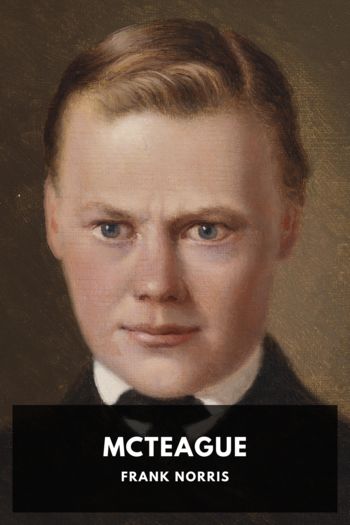McTeague, Frank Norris [polar express read aloud .txt] 📗

- Author: Frank Norris
Book online «McTeague, Frank Norris [polar express read aloud .txt] 📗». Author Frank Norris
At half-past five o’clock Mr. Sieppe marshalled the party together. It was time to return home.
The family insisted that Marcus and McTeague should take supper with them at their home and should stay over night. Mrs. Sieppe argued they could get no decent supper if they went back to the city at that hour; that they could catch an early morning boat and reach their business in good time. The two friends accepted.
The Sieppes lived in a little box of a house at the foot of B Street, the first house to the right as one went up from the station. It was two stories high, with a funny red mansard roof of oval slates. The interior was cut up into innumerable tiny rooms, some of them so small as to be hardly better than sleeping closets. In the back yard was a contrivance for pumping water from the cistern that interested McTeague at once. It was a dog-wheel, a huge revolving box in which the unhappy black greyhound spent most of his waking hours. It was his kennel; he slept in it. From time to time during the day Mrs. Sieppe appeared on the back doorstep, crying shrilly, “Hoop, hoop!” She threw lumps of coal at him, waking him to his work.
They were all very tired, and went to bed early. After great discussion it was decided that Marcus would sleep upon the lounge in the front parlor. Trina would sleep with August, giving up her room to McTeague. Selina went to her home, a block or so above the Sieppes’s. At nine o’clock Mr. Sieppe showed McTeague to his room and left him to himself with a newly lighted candle.
For a long time after Mr. Sieppe had gone McTeague stood motionless in the middle of the room, his elbows pressed close to his sides, looking obliquely from the corners of his eyes. He hardly dared to move. He was in Trina’s room.
It was an ordinary little room. A clean white matting was on the floor; gray paper, spotted with pink and green flowers, covered the walls. In one corner, under a white netting, was a little bed, the woodwork gayly painted with knots of bright flowers. Near it, against the wall, was a black walnut bureau. A worktable with spiral legs stood by the window, which was hung with a green and gold window curtain. Opposite the window the closet door stood ajar, while in the corner across from the bed was a tiny washstand with two clean towels.
And that was all. But it was Trina’s room. McTeague was in his lady’s bower; it seemed to him a little nest, intimate, discreet. He felt hideously out of place. He was an intruder; he, with his enormous feet, his colossal bones, his crude, brutal gestures. The mere weight of his limbs, he was sure, would crush the little bedstead like an eggshell.
Then, as this first sensation wore off, he began to feel the charm of the little chamber. It was as though Trina were close by, but invisible. McTeague felt all the delight of her presence without the embarrassment that usually accompanied it. He was near to her—nearer than he had ever been before. He saw into her daily life, her little ways and manners, her habits, her very thoughts. And was there not in the air of that room a certain faint perfume that he knew, that recalled her to his mind with marvellous vividness?
As he put the candle down upon the bureau he saw her hairbrush lying there. Instantly he picked it up, and, without knowing why, held it to his face. With what a delicious odor was it redolent! That heavy, enervating odor of her hair—her wonderful, royal hair! The smell of that little hairbrush was talismanic. He had but to close his eyes to see her as distinctly as in a mirror. He saw her tiny, round figure, dressed all in black—for, curiously enough, it was his very first impression of Trina that came back to him now—not the Trina of the later occasions, not the Trina of the blue cloth skirt and white sailor. He saw her as he had seen her the day that Marcus had introduced them: saw her pale, round face; her narrow, half-open eyes, blue like the eyes of a baby; her tiny, pale ears, suggestive of anaemia; the freckles across the bridge of her nose; her pale lips; the tiara of royal black hair; and, above all, the delicious poise of the head, tipped back as though by the weight of all that hair—the poise that thrust out her chin a little, with the movement that was so confiding, so innocent, so nearly infantile.
McTeague went softly about the room from one object to another, beholding Trina in everything he touched or looked at. He came at last to the closet door. It was ajar. He opened it wide, and paused upon the threshold.
Trina’s clothes were hanging there—skirts and waists, jackets, and stiff white petticoats. What a vision! For an instant McTeague caught his breath, spellbound. If he had suddenly discovered Trina herself there, smiling at him, holding out her hands, he could hardly have been more overcome. Instantly he recognized the black dress she had worn on that famous first day. There it was, the little jacket she had carried over her arm the day he had terrified her with his blundering declaration, and still others, and others—a whole group of Trinas faced





Comments (0)